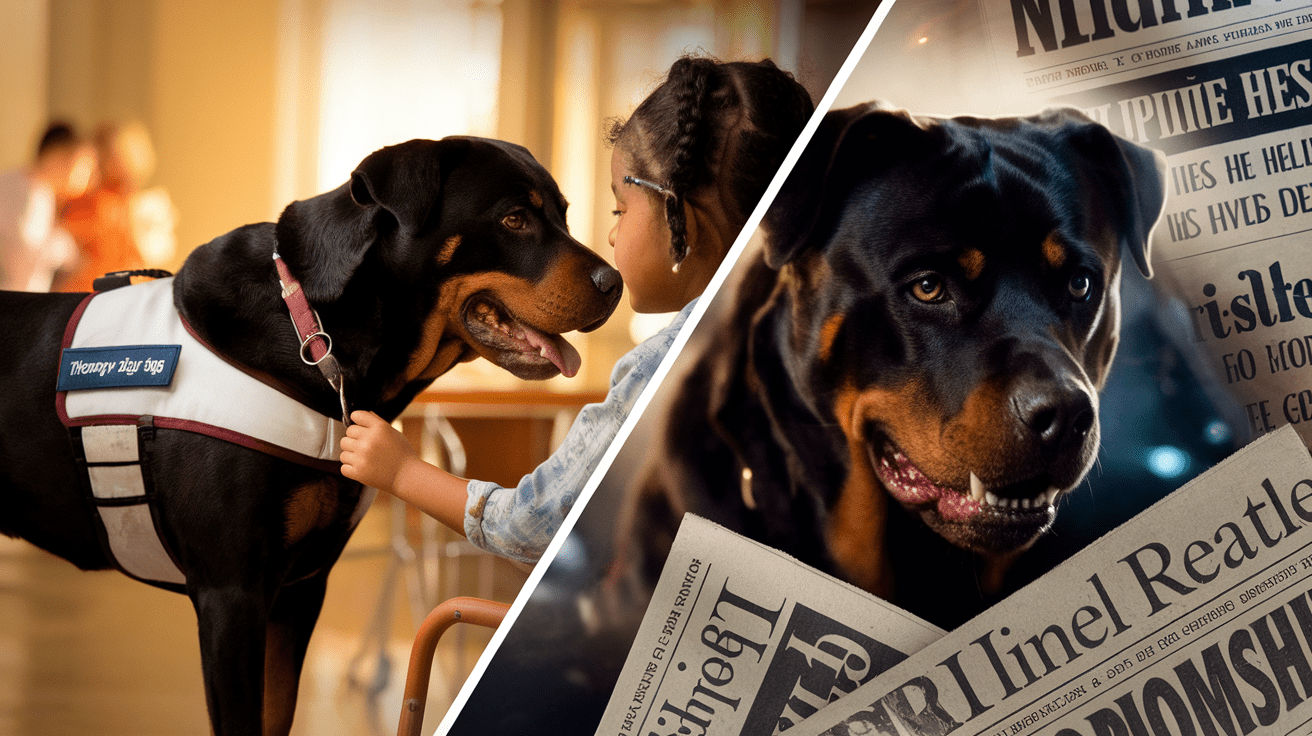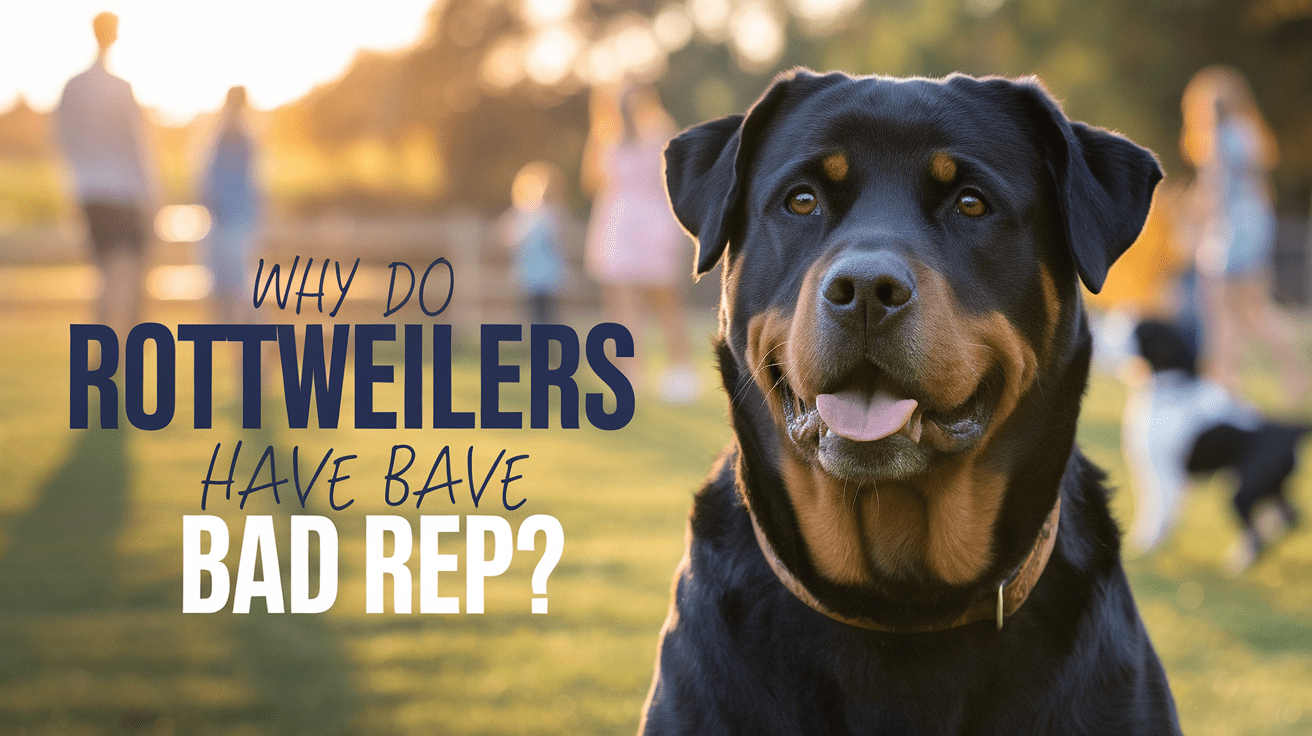Understanding Rottweilers: Key Takeaways
- ✓ Media Misrepresentation: Rottweilers often face unfair prejudice due to sensationalized media coverage and Hollywood stereotypes rather than factual evidence.
- ✓ True Temperament: Well-trained Rottweilers are intelligent, loyal, and gentle companions, scoring high in temperament tests compared to many family breeds.
- ✓ Responsible Ownership: Proper training, early socialization, and consistent care are crucial factors in developing a well-behaved Rottweiler.
- ✓ Breed Characteristics: Their strength and protective instincts come from their working heritage, but these traits don’t equate to aggression.
Are Rottweilers really the intimidating brutes that media often portrays them to be? As a veterinarian and proud Rottweiler owner for over 15 years, I’ve witnessed firsthand how these magnificent dogs are often misunderstood. According to the American Kennel Club, Rottweilers consistently rank among the top 10 most popular dog breeds, yet they continue to face unwarranted prejudice and fear.
The truth about Rottweilers might surprise you. These intelligent and loyal companions have been unfairly labeled as aggressive, largely due to sensationalized media coverage and Hollywood stereotypes. Having treated countless Rottweilers in my practice and raised three of my own, I can confidently say that their reputation often stems from misconceptions rather than reality.
Let’s dive into the fascinating world of Rottweilers and uncover the truth behind their intimidating reputation, examining both the historical context and the real-world evidence that paints a very different picture of these misunderstood gentle giants.
Historical Background and Media Influence

The story of Rottweilers begins in ancient Rome, where these powerful dogs served as cattle drovers and guardians of the Roman legions. During my veterinary studies at Cornell, I was fascinated to learn how these dogs’ working heritage shaped their character. Their original purpose as hardworking, multipurpose dogs required both strength and intelligence – traits that continue to define the breed today.
Unfortunately, the media’s portrayal of Rottweilers has strayed far from their noble origins. In my 15 years of practice, I’ve seen how movies like “The Omen” and sensationalized news coverage have unfairly cast these dogs as villains. According to a study by the National Center for Biotechnology Information, media reports of dog attacks often show bias in breed reporting, with certain breeds, including Rottweilers, receiving disproportionate negative coverage.
Let me share a personal experience: Last year, I treated a Rottweiler named Max who had saved his family from a house fire. Despite this heroic act, local news barely covered the story. Yet, when another Rottweiler in our area merely growled at a passerby, it made front-page news. This disparity in media coverage perpetuates negative stereotypes.
The impact of such biased reporting extends beyond mere perception. These portrayals have led to:
• Breed-specific legislation in some areas
• Housing restrictions for Rottweiler owners
• Increased insurance premiums
• Unwarranted fear from the public
What’s particularly frustrating is how Hollywood often uses Rottweilers’ impressive appearance to create dramatic effect, while ignoring their true nature. Think of it like judging a book solely by its cover – you miss the rich story within. As both a veterinarian and owner, I can attest that these dogs are more likely to shower you with affection than show any aggression when properly trained and socialized.
The media’s influence has created a challenging cycle: negative portrayals lead to fear, which leads to misunderstandings about normal dog behavior, which in turn can lead to more negative incidents. Breaking this cycle requires understanding the breed’s true nature and sharing positive, accurate information about these remarkable dogs.
Common Misconceptions That Damage Rottweiler’s Reputation

Through my years of veterinary practice, I’ve encountered numerous misconceptions about Rottweilers that unfairly tarnish their reputation. These misunderstandings often stem from fear rather than facts, and as both a veterinarian and long-time Rottweiler owner, I feel compelled to address them.
Aggressive Nature Myths
Perhaps the most damaging misconception is that Rottweilers are inherently aggressive. According to the American Veterinary Medical Association, no single breed is inherently more dangerous than others. In fact, in my practice, I’ve treated more bite incidents from smaller breeds than from Rottweilers.
What many don’t realize is that aggression is typically a result of:
• Lack of proper training and socialization
• Fear or anxiety
• Medical conditions
• Previous trauma or abuse
Just last month, I worked with a rescue Rottweiler named Bear who was labeled as “aggressive” by his previous owners. After proper medical examination and behavioral assessment, we discovered he was simply suffering from untreated hip pain. With appropriate medical care and gentle training, Bear transformed into the sweetest therapy dog candidate I’ve ever evaluated.
Size and Strength Concerns
Another common misconception revolves around their size and strength. Yes, Rottweilers are powerful dogs, but strength doesn’t equate to aggression. Think of them like professional athletes – just because someone is strong doesn’t mean they’re prone to violence.
Their muscular build often intimidates people, but what many don’t know is that Rottweilers are naturally gentle with their strength. I’ve countless times witnessed my own Rottweiler delicately playing with my toddler, showing remarkable awareness and control.
Guard Dog Stereotype
While Rottweilers have natural protective instincts, this doesn’t mean they’re aggressive guard dogs. Their protective nature comes from a place of devotion and intelligence, not hostility. During my career, I’ve observed that well-trained Rottweilers display excellent judgment about real threats versus normal everyday interactions.
The key to understanding Rottweilers lies in recognizing that their behavior, like any dog’s, is shaped by:
• Early socialization experiences
• Consistent, positive training methods
• The quality of care they receive
• Their environment and family dynamics
These misconceptions persist partly because people often confuse protection with aggression. A well-trained Rottweiler will protect their family through alerting and deterrence, not through unprovoked aggression. They’re more likely to stop a threat by their mere presence than by any aggressive action.
The Truth About Rottweiler Temperament

After treating thousands of dogs throughout my veterinary career, I can confidently say that Rottweilers possess one of the most balanced and reliable temperaments among large breeds. According to a comprehensive study in Applied Animal Behaviour Science, Rottweilers scored higher in temperament tests than many popular family breeds, particularly in stability and confidence.
Breed Characteristics and Personality Traits
Let me share a recent experience that perfectly illustrates the true Rottweiler temperament. Last week, a Rottweiler named Luna came into my clinic for her annual check-up. Despite being in an unfamiliar environment with strange sounds and smells, she remained calm and cooperative throughout the examination, even giving our staff gentle kisses. This behavior exemplifies the breed’s natural disposition.
The core personality traits I consistently observe in well-raised Rottweilers include:
• Exceptional intelligence and quick learning ability
• Deep loyalty to family members
• Gentle nature with children when properly socialized
• Calm and confident demeanor
• Natural discernment of different situations
Responsible Ownership Impact
The truth is, a Rottweiler’s temperament is significantly influenced by responsible ownership. Think of raising a Rottweiler like cultivating a garden – with proper care, attention, and the right environment, it will flourish. Without these elements, even the best seeds can’t reach their full potential.
Key factors that shape a positive temperament include:
• Early socialization (before 16 weeks)
• Consistent, positive training methods
• Regular exercise and mental stimulation
• Strong family integration
Expert Opinions and Research
In my collaborations with animal behaviorists and fellow veterinarians, there’s a consensus that Rottweilers are highly trainable and adaptable. I’ve witnessed countless success stories where Rottweilers excel as therapy dogs, service animals, and beloved family companions.
One particularly memorable case involved a senior Rottweiler who became a reading companion at our local library. Children who were initially hesitant around dogs became comfortable and confident readers in his calm presence. This perfectly demonstrates the breed’s natural ability to adapt their behavior to different situations.
The key to understanding Rottweilers is recognizing that their temperament is a beautiful blend of intelligence, loyalty, and adaptability. With proper guidance and care, these dogs consistently prove themselves to be exceptional family members and working companions. Their true nature emerges not through fear or force, but through trust, respect, and proper training.
Frequently Asked Questions About Rottweilers’ Reputation
Conclusion
As both a veterinarian and long-time Rottweiler owner, I’ve witnessed how these magnificent dogs consistently prove their critics wrong. The contrast between their media portrayal and their true nature couldn’t be more striking. Through proper training, socialization, and responsible ownership, Rottweilers reveal themselves to be exceptional family companions with remarkable intelligence and unwavering loyalty.
The key to changing public perception lies in education and sharing positive experiences. Rather than focusing on outdated stereotypes, we should celebrate these dogs for what they truly are – gentle giants with hearts of gold. Remember, every Rottweiler has the potential to be an outstanding companion, therapy dog, or working partner. It’s time we move past the misconceptions and embrace the true nature of this remarkable breed, giving them the fair chance they deserve.
Understanding proper training techniques is crucial for raising a well-balanced Rottweiler. For a comprehensive approach to training these intelligent dogs, our detailed Rottweiler Training Guide covers everything from basic obedience to advanced commands, helping owners develop strong bonds with their pets while ensuring proper socialization and behavior. This expert-backed resource is essential for both new and experienced Rottweiler owners who want to bring out the best in their loyal companions.







